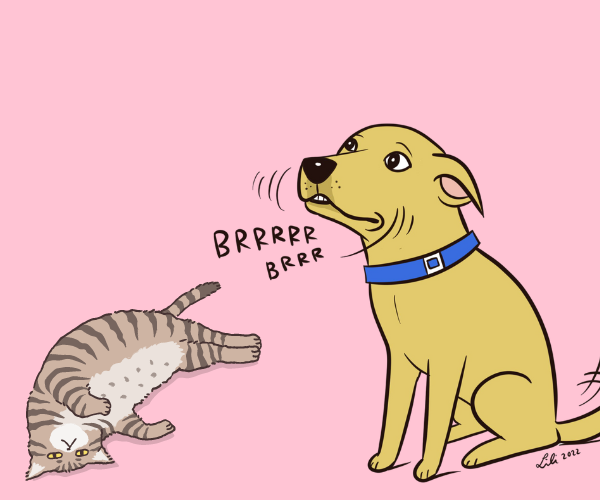Have you ever seen your dog barking at your cat’s litter box? This behavior is not uncommon among dogs, and it can be quite confusing or frustrating for dog owners. It’s understandable to be perplexed by this behavior, as it may seem strange or unnecessary for your dog to bark at a litter box. In this article, we will explore some reasons why your dog might be barking at the litter box and offer some tips for managing this behavior.

Dogs and Scent
Dogs Have an Incredible Sense of Smell
- Dogs have up to 300 million scent receptors in their noses
- They can detect scents that humans are not even aware of
Dogs Use Scent to Understand Their Environment and Communicate With Other Animals
- Dogs use scent to identify other animals, food and water sources, and potential dangers
- They can even detect human emotions through scent
A Cat Litter Box Might Produce an Interesting or Strong Scent for a Dog
- The scent of cat feces and urine can be very strong and appealing to dogs, especially those with a strong prey drive
- Dogs may be curious about the smell of the litter itself, which can contain a variety of scents depending on the type of litter and additives used
Instinctual Behaviors
Dogs Are Wired to Respond to Certain Stimuli in Specific Ways
- Barking can be triggered by a range of factors, including the presence of a potential threat or the excitement of playtime
- A dog’s instinctual behavior might be to investigate or even mark the area around the litter box, which could lead to barking if they feel the need to communicate their presence or claim territory
Fear or Anxiety Can Cause a Dog to Bark
- Fear or anxiety can cause a dog to bark or exhibit other unwanted behaviors
- These emotions may be triggered by specific stimuli or experiences
- A dog may be afraid or anxious around the litter box due to unfamiliarity or previous negative experiences
- The scent of a litter box can also be overwhelming or unpleasant for some dogs
Potential Reasons for Fear or Anxiety
- Fear or anxiety around the litter box may be caused by a traumatic experience or lack of exposure during socialization
- The presence of other animals, such as cats, can also contribute to fear or anxiety in some dogs
Curiosity
Curiosity Can Motivate a Dog’s Behavior
- Curiosity is a natural behavior for dogs, who are naturally curious about their environment and other animals
- This curiosity can drive dogs to investigate and explore the contents of a litter box
A Dog Might Be Curious About the Contents of a Cat Litter Box
- Dogs may be interested in the smell, texture, or contents of a litter box
- This curiosity can lead to barking or other behaviors as the dog tries to explore or interact with the litter box
A Dog’s Curiosity Might Lead To Barking or Other Behaviors
- Curiosity can sometimes turn into unwanted behaviors, such as barking, digging, or chewing
- If your dog is excessively barking at the litter box, it may be a sign that their curiosity has turned into a problematic behavior
Training and Management
Training Can Help Dogs Stop Barking at a Cat Litter Box
- Positive reinforcement training can be used to teach dogs to associate good things with the litter box
- Desensitization training can help dogs get used to the litter box and reduce their fear or anxiety
Tips for Managing a Dog’s Behavior Around a Cat Litter Box
- Keep the litter box out of reach or in a separate room to prevent unwanted interactions
- Monitor your dog’s behavior around the litter box and intervene if they start to bark or exhibit other unwanted behaviors
- Consider consulting a professional dog trainer or behaviorist if your dog’s behavior is causing problems or is difficult to manage
Conclusion
In conclusion, there are several reasons why a dog might bark at a cat litter box, including their keen sense of smell, instinctual behaviors, fear or anxiety, and curiosity. Understanding these factors can help dog owners manage their dog’s behavior around the litter box and prevent unwanted barking or other behaviors. It’s important to remember that excessive barking or problematic behaviors may indicate underlying issues that require professional help. By being proactive and seeking assistance when necessary, dog owners can create a happy and healthy environment for both their dogs and their cats.

Doctor of Veterinary Medicine (D.V.M.) at Nation Taiwan University,Master of Science (M.S.) in Biomedical Engineering at National Taiwan University of Science and Technology




